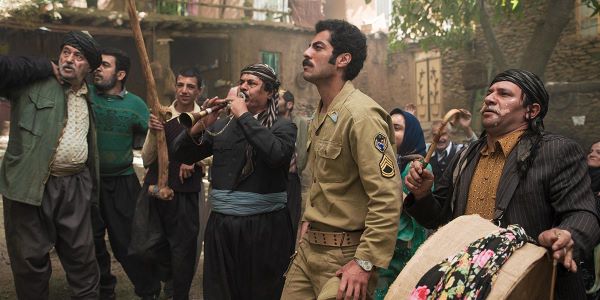
The award for the most intriguing one-off at the Toronto International Film Festival goes to Zalava, the debut feature by Iranian Kurdish director Arsalan Amiri. He has mashed together a story of demonic possession and romance with devilishly dark satire. In his video introduction for virtual festivalgoers—part of this year’s hybrid addition—he said that the movie “could take place anywhere.” Yes, it could, anywhere where fear runs amok. He has made a one-size-fits-all allegory. Let me put it this way, I rather see this film than yet another production of the play The Crucible any day. This movie is a lot more fun and unpredictable.
It takes place in 1978 before the Iranian Revolution in Zalava, a remote hilltop village in Iran’s Kurdistan region, and its townspeople live under the jurisdiction of the soon-to-be-departing Sergeant Massoud (Navid Pourfaraj). He’s the prototype of the 1970s macho man: tall, dark, handsome, with the thickest of mustaches. But before he’s reassigned, the policeman undertakes to clear his reputation: the villagers are up in arms over his decision to confiscate their rifles. Without their weapons, they cannot kill a demon that has taken over the town. One father bemoans that his daughter, who he believes was possessed, would not have died had he had the opportunity to shoot her in the leg to slay the evil spirit. (Massoud has heard a theory that someone has planted the demonic rumor in order to buy Zalava’s land on the cheap.)
There is apparently a list of elaborate rules to destroying a demon. For example, you must shoot the inflicted below the waist so that it can’t latch on to another victim. As a whole, demons are afraid of metals, which is why metallic hooks and other apparatus hang in front of the homes, with doors made out of steel.
As the villagers, the ensemble plays it straight. Though the townsfolk seem to be making the rules as they go along, they sincerely believe in demonic possession, and they mean business, pleading with the sergeant to allow the exorcist, Amardan (Pouria Rahimi Sam), to liberate Zalava from evil. In what serves as the town’s square, they form a mob, carrying sticks, hoes, and anything to arm themselves—I would have sworn I saw some pitchforks in the crowd. Perhaps the only thing they lack are torches.
They blame demons for the marks on their skin and for turning their hair white, so a young government doctor, Maliheh (Hoda Zeinolabedin), has arrived to this backwater to investigate. She also acts as an intermediator, trying to relieve the tension between the police officer and the community. Of course, the village knows that Massoud will do as she asks. Everyone has seen him make googly eyes at her and knows he’s in love—except him.
Heeding the villagers’ demands, the exorcist claims he has captured a menacing demon in a sealed glass jar, which the sergeant confiscates before arresting Amardan for fraud. Now this is when things get a little spooky. Massoud takes the jar (a clever MacGuffin) back to the police barracks and leaves it on top of his desk, where in the dark it becomes the object of curiosity for a pert black cat. Oh, and there is something moving about in a burlap bag right next to the jar. You want jump scares? They’re here. (Either the cat is naturally gifted or the film crew had the world’s best and most patient cat wrangler: this kitty almost steals the film.)
For a movie of many moods, the tone shifts again when the story line takes a turn that I, for one, did not see coming. The director takes chances that pay off, while still leaving the audience with a little bit of mystery.
The director previously cowrote and produced Nahid, a beautifully acted, noirish contemporary drama, directed by his wife, Ida Panahandeh. She cowrote Zalava’s script along with Amiri and Tahmineh Bahram.
On September 29, Zalava will make its U.S. premiere at Fantastic Fest in Austin, TX.






Leave A Comment